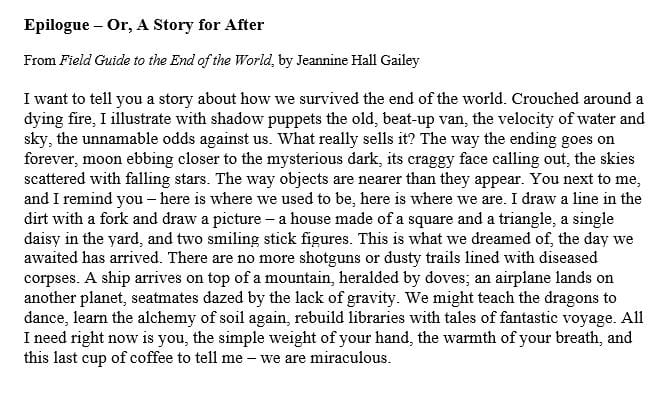Reading Tomorrow in Tacoma and Writing Poetry in Dark Times
- At May 24, 2017
- By Jeannine Gailey
- In Blog
 0
0
Reading in Tacoma
Tomorrow I’ll be reading with San Francisco poet Kendra Tanacea, at King’s Books in Tacoma at 7 PM. I hope to see some of you there! I’ll be reading some end-of-the-world poems from my latest book, Field Guide to the End of the World, and Kendra will be reading from her new collection A Filament Burns in Blue Degrees from Lost Horse. I haven’t read in Tacoma for a while, so I’m excited abou tit!
Poetry in Dark Times
I can tell you I’m troubled when I read the news lately, and you probably are, too. The Manchester bombing in particular was so upsetting, I think because so many of the victims were young girls and boys. I did notice on Twitter a dramatic positive response from people in Manchester – offering to look for people, offering rides and cell phones and food, offering places to stay.
I have a poem in Field Guide to the End of the World called “The Narcissist’s Apocalypse,” in which the speaker, on learning she may be about to die, imagines the world ending as well. I actually think that the opposite happens with many people – when confronted with the worst things possible, their tendency is to reach out and help others. There are many stories of people going to the aid of the injured at the concert in Manchester, homeless men helping injured children, children helping each other, parents helping other people’s children. When I was told I had cancer last year that might be terminal, my instinct wasn’t to destroy, but to celebrate the beautiful things around me – the flowering trees, my loved ones, animals. (I have often joked that my camera became strangely full of tree pictures last year.) But I think when people are confronted by too much bad news, however, they have a tendency to either go into denial, try to hide from it, or become callous to it. I think poetry is one way to fight against that tendency to shut ourselves down or turn our emotions off.
Maggie Smith’s poem, “Good Bones,” has been making the rounds as a kind of comforting example of what poetry can do in a crisis, as does Adam Zagajewski’s “Try to Praise the Mutilated World.”
The act of writing poetry itself can be an impulse against darkness, towards creation and healing, even if the tone is angry or hurt or despairing. A poem can be a thing that connects the writer with an audience, something that connects one person to another with a tremulous strand of empathy, perhaps part of a healing web we can spin around each other all the time, this empathy, this desire to connect instead of severing connections, to celebrate and reach out instead of destroy. What can we do to help heal our mutilated world, or to try to make it more beautiful? Instead of tearing each other apart with apathy, hatred, prejudice, how to help build each other up, build a world that we can imagine being…better? Can we respond to terror and despair with more scientific achievements, more stories, more beautiful work of art or architecture, even computer code that might help the world rather than wreck it?
Part of the theme of Field Guide to the End of the World was about my own response to catastrophe, how we might imagine surviving the worst possible scenarios, how we might respond to chaos and disaster. This is how I ended the book, with “Epilogue.”



 Jeannine Hall Gailey served as the second Poet Laureate of Redmond, Washington and the author of Becoming the Villainess, She Returns to the Floating World, Unexplained Fevers, The Robot Scientist’s Daughter, and winner of the Moon City Press Book Prize and SFPA’s Elgin Award, Field Guide to the End of the World. Her latest, Flare, Corona from BOA Editions, was a finalist for the Washington State Book Award. She’s also the author of PR for Poets, a Guidebook to Publicity and Marketing. Her work has been featured on NPR’s The Writer’s Almanac, Verse Daily and The Year’s Best Fantasy and Horror. Her poems have appeared in The American Poetry Review, Poetry, and JAMA.
Jeannine Hall Gailey served as the second Poet Laureate of Redmond, Washington and the author of Becoming the Villainess, She Returns to the Floating World, Unexplained Fevers, The Robot Scientist’s Daughter, and winner of the Moon City Press Book Prize and SFPA’s Elgin Award, Field Guide to the End of the World. Her latest, Flare, Corona from BOA Editions, was a finalist for the Washington State Book Award. She’s also the author of PR for Poets, a Guidebook to Publicity and Marketing. Her work has been featured on NPR’s The Writer’s Almanac, Verse Daily and The Year’s Best Fantasy and Horror. Her poems have appeared in The American Poetry Review, Poetry, and JAMA.






